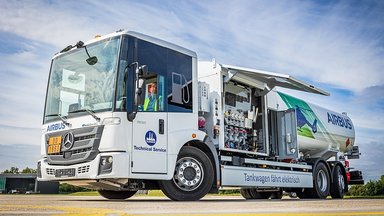
Charge, refuel, fly: Delivering the Mercedes-Benz eEconic for aircraft refueling
Download

Charge, refuel, fly: Delivering the Mercedes-Benz eEconic for aircraft refueling
Mercedes-Benz Special Trucks handed-over the world's first refueling vehicle based on an electric series truck from Daimler Truck. The procurement is an important step in the electrification of the ground handling fleet for the refueling service provider Skytanking at Stuttgart Airport. In cooperation with the tank body specialist Esterer, the electric truck was equipped with a 40.000-liter fuel tank that draws its electrical…
- Mercedes-Benz Special Trucks handed-over the world's first refueling vehicle based on an electric series truck from Daimler Truck.
- The procurement is an important step in the electrification of the ground handling fleet for the refueling service provider Skytanking at Stuttgart Airport.
- In cooperation with the tank body specialist Esterer, the electric truck was equipped with a 40.000-liter fuel tank that draws its electrical energy directly from the vehicle batteries.
- Franziska Cusumano, Head of Mercedes-Benz Special Trucks: "We are delighted that our locally CO2-neutral eEconic is in demand for an increasing number of applications and is now being used with a tank body for the first time. As an all-electric truck, it will help reduce emissions in ground handling operations at Stuttgart Airport."
- Julia Esterer, Managing Director of Dr.-Ing. Ulrich Esterer GmbH & Co. KG: "This vehicle is also the first all-electric tanker for Esterer. The development of a high-performance commercial vehicle with a total weight of over 50 tons was a special challenge for us. Today, we can present a comprehensive solution that is forward-looking, both economically and environmentally."
- Oscar Sanabria, Regional Manager CNE Operations & IT, Skytanking: "Our tests with the new refueling vehicle went smoothly. Its handling during battery charging, kerosene filling, and aircraft refueling is easy and safe."
Leinfelden-Echterdingen/Stuttgart - Today, Mercedes-Benz Special Trucks and tank body specialist Esterer handed-over an all-electric refueling vehicle based on Mercedes-Benz eEconic at Stuttgart Airport. The all-electric truck will be used there as a test vehicle in the finalize! project for the refueling service provider Skytanking. The company Esterer has equipped it with electrically operated 40.000-liter refueling technology, which draws the energy for driving the pump directly from the vehicle batteries. It is the first refueling vehicle based on an electric series production vehicle from Daimler Truck, and also the first fully electric refueling vehicle in this class at Stuttgart Airport. The all-electric drive reduces noise and heat generation and emits neither CO2 nor particulate matter. This benefits the employees in the direct vicinity of the vehicles and is an important step for Skytanking towards electrifying its ground handling fleet.
Franziska Cusumano, Head of Mercedes-Benz Special Trucks: "We are delighted that our locally CO2-neutral eEconic is in demand for an increasing number of applications and is now being used with a tank body for the first time. As an all-electric truck, it will help reduce emissions in ground handling operations at Stuttgart Airport. With its experience in control technology, battery technology and high-voltage technology, Esterer is an excellent partner."
Julia Esterer, Managing Director of Esterer GmbH: "This vehicle is also the first all-electric tanker for Esterer. The development of a high-performance commercial vehicle with a total weight of over 50 tons was a special challenge for us. The selection of the right components was decisive in order to achieve optimum performance at the interface to the high-voltage technology. Today, we can present a comprehensive solution that is forward-looking, both economically and environmentally. The eEconic with its large installation space availability and our safety and control technology complement very well.”
Oscar Sanabria, Regional Manager CNE Operations & IT, Skytanking: "Our tests with the new refueling vehicle went smoothly. Its handling during battery charging, kerosene filling, and aircraft refueling is simple and safe. With the installed battery capacity we expect to use the eEconic for aircraft refueling for at least one day without intermittent charging. The objective of the project is to collect data that can support this and serve as a starting point for future planning in the industry."
The first refueling vehicle based on an electric series-production vehicle from Daimler Truck
The all-electric Mercedes-Benz eEconic, as a so-called low-floor truck with a total height of less than 2.80 meters, can easily pass underneath the wings of an aircraft. This allows the crew to stay directly under the aircraft tank, which is located within the wing body, when refueling under the wing.
The low panoramic window of the “DirectVision” cab and the low seat position give the driver a wide viewing angle during approach, providing excellent visibility among the various traffic participants on the apron. With the heated Thermocontrol windshield, visibility remains relatively good, even in poor weather conditions. On the front passenger side, the floor-to-ceiling glazed folding door ensures unobstructed visibility.
With this cab design and the numerous safety features already familiar from eEconic on-road use, the refueling vehicle, which is 18.50 meters in length, can also be deployed amidst the people and machinery on the apron. In addition to intelligent safety assistance systems such as the fifth-generation Active Brake Assist emergency braking assistant, there is also a sensor installed in the side collision protection at the level of the battery packs.
The electric truck has an electric axle with an integrated drive unit, as well as two electric motors that generate 330 kW of continuous power. When braking, electrical energy can be recovered through recuperation and fed back into the batteries. This can increase the operational time of the refueling vehicle, especially during stop-and-go operation while driving and refueling. The battery packs of the eEconic can be charged at up to 160 kW. Since the pump in the tank body also draws its electrical energy directly from the vehicle batteries, a single charging process will ensure the energy supply of the vehicle and body.
Daimler Truck and Esterer use a shared user interface to display all relevant information, such as the batteries' state of charge, remaining range, tank body fill level, or energy consumption, on the display in the driver's cab.
An innovative tank body from Esterer
The Esterer tank body, with its capacity of 40.000 liters, can refuel a wide range of aircraft. It draws directly on the electrical energy of the batteries that also power the vehicle. This concept of direct actuation of the pump is unique for use in aircraft refueling. For actual operations at Stuttgart Airport, this means: For one day at least, an hour of charging time is sufficient for the vehicle and tank body to be used for ground handling operations without charging interruptions. With a flow volume of 1.500 liters per minute, a typical charter aircraft can be fully refueled in under 20 minutes, although this is rarely necessary as aircraft tanks are usually neither completely empty nor - for weight reasons - completely full.
The vehicle and safety concept was implemented jointly by the experts from Mercedes-Benz Special Trucks and Esterer in close collaboration. In addition to technical solutions, this also included training for ground personnel.
Stuttgart Airport with Project Finalize! A pioneer in electrification
Stuttgart Airport has set itself the objective of reducing its direct greenhouse gas emissions to net zero by 2040. By 2030, all aircraft handling at Stuttgart Airport is to be climate-neutral. Now that large parts of the handling fleet as well as all passenger buses and baggage tractors have been converted to battery electric vehicles, the finalize! project is now focusing on the electrification of the refuelling fleet.
Project Finalize! is a component of Stuttgart Airport's climate strategy STRzero, and is being supported by the Technical University of Aachen. The real operation of the test vehicle is intended to help define, understand, and optimize the required charging processes. Stuttgart Airport will also serve as a live demonstrator to foster discussion of the transferability of the measures to other airports and other sectors. The project is being financed in part by the German Federal Ministry for Economic Affairs and Climate Protection.
Article assets

Charge, refuel, fly: Delivering the Mercedes-Benz eEconic for aircraft refueling

Charge, refuel, fly: Delivering the Mercedes-Benz eEconic for aircraft refueling

Charge, refuel, fly: Delivering the Mercedes-Benz eEconic for aircraft refueling

Charge, refuel, fly: Delivering the Mercedes-Benz eEconic for aircraft refueling

Charge, refuel, fly: Delivering the Mercedes-Benz eEconic for aircraft refueling

Charge, refuel, fly: Delivering the Mercedes-Benz eEconic for aircraft refueling

Charge, refuel, fly: Delivering the Mercedes-Benz eEconic for aircraft refueling

Charge, refuel, fly: Delivering the Mercedes-Benz eEconic for aircraft refueling

Charge, refuel, fly: Delivering the Mercedes-Benz eEconic for aircraft refueling

Charge, refuel, fly: Delivering the Mercedes-Benz eEconic for aircraft refueling

Charge, refuel, fly: Delivering the Mercedes-Benz eEconic for aircraft refueling

Charge, refuel, fly: Delivering the Mercedes-Benz eEconic for aircraft refueling

Charge, refuel, fly: Delivering the Mercedes-Benz eEconic for aircraft refueling

Charge, refuel, fly: Delivering the Mercedes-Benz eEconic for aircraft refueling

Charge, refuel, fly: Delivering the Mercedes-Benz eEconic for aircraft refueling

Charge, refuel, fly: Delivering the Mercedes-Benz eEconic for aircraft refueling

Charge, refuel, fly: Delivering the Mercedes-Benz eEconic for aircraft refueling
Charge, refuel, fly: Delivering the Mercedes-Benz eEconic for aircraft refueling
Charge, refuel, fly: Delivering the Mercedes-Benz eEconic for aircraft refueling
Charge, refuel, fly: Delivering the Mercedes-Benz eEconic for aircraft refueling

Lukas Hettmannsperger
Spokesperson Mercedes-Benz Special Trucks
lukas.hettmannsperger@daimlertruck.com
+49 170 3871112

Ulrike Burkhart
Spokesperson Mercedes-Benz Trucks Product, Service & eTruck
ulrike.burkhart@daimlertruck.com
+49 160 861 3757






















